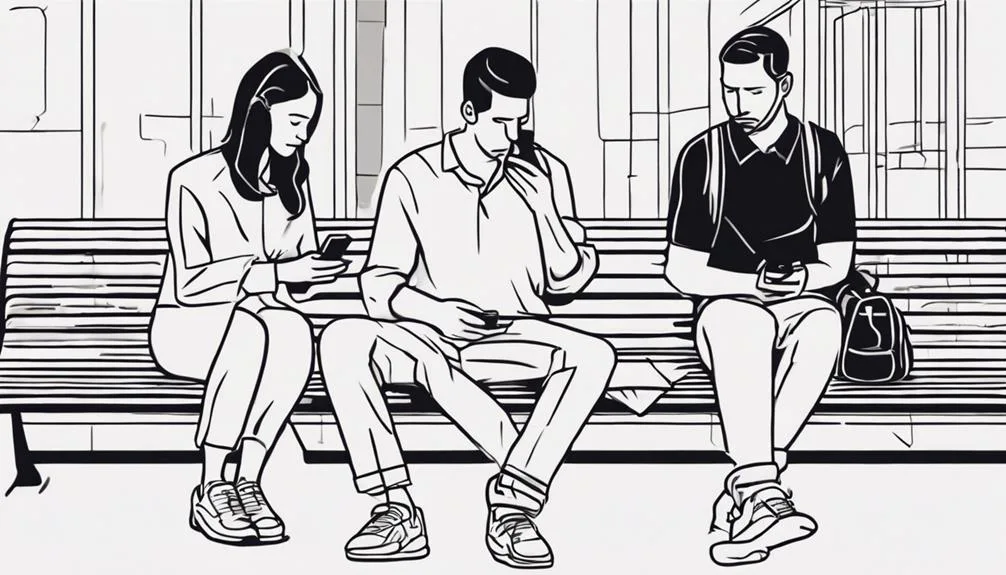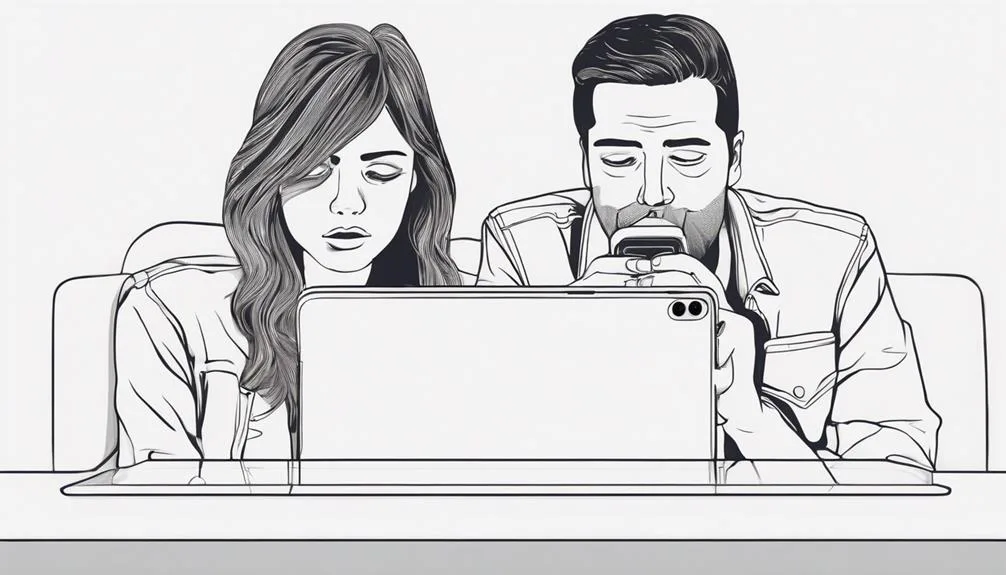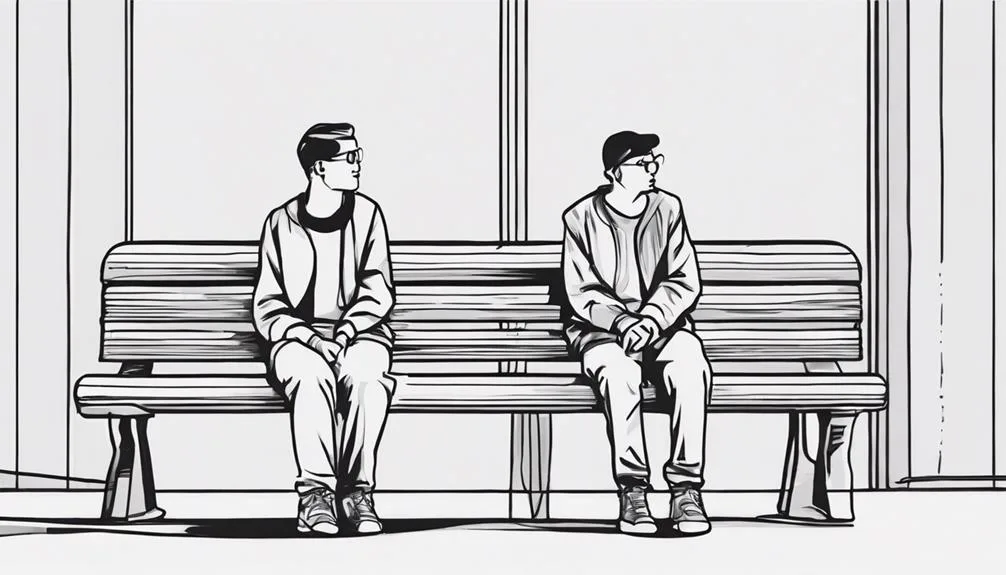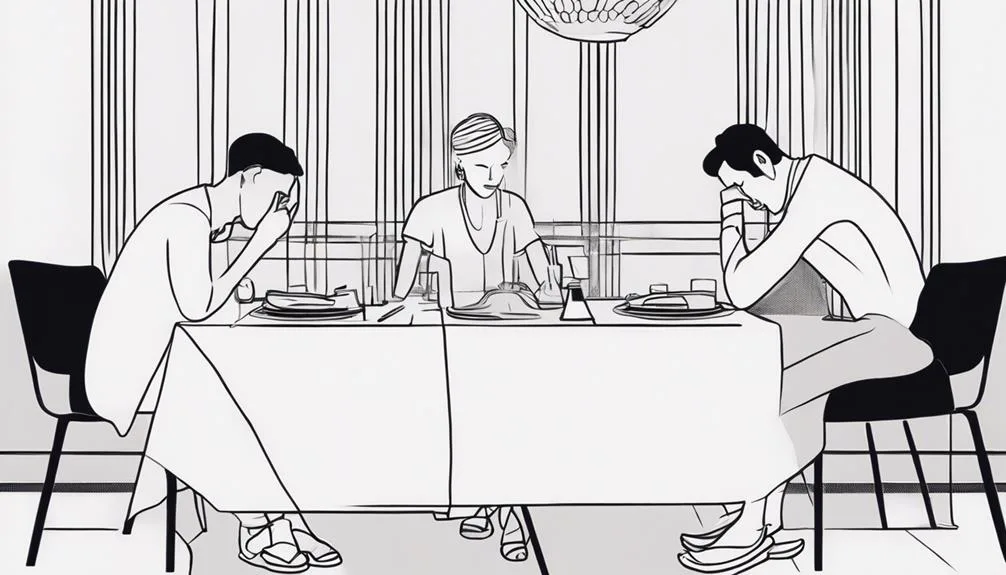Jealousy in a relationship can show up in many ways. You might notice it when your partner spends a lot of time looking at someone else's social media or if you feel uneasy talking about a new coworker. Signs like always asking for reassurance or too many questions can be warning signs.
It's important to understand these signs to figure out if your relationship is healthy or if there might be issues to address.
Key Takeaways
- Jealousy manifests through constant reassurance-seeking, indicating deep-seated insecurities.
- Snooping in personal devices reveals trust issues and a lack of confidence in the relationship.
- Unfounded accusations and misinterpretations of behavior erode trust and communication.
- Isolating partners from friends and family is a controlling behavior stemming from jealousy.
Constant Need for Reassurance

A constant need for reassurance often signals jealousy in a relationship, as it reflects an underlying insecurity about one's place in their partner's life. This craving for validation isn't just about wanting to feel loved; it's deeply rooted in self-esteem issues.
You might find yourself questioning your partner's feelings more than usual, seeking constant affirmation that you're still wanted and valued. This behavior, while seemingly harmless at first, can lead to a communication breakdown. Instead of open, honest conversations, you're stuck in a loop of needing reassurance, which can frustrate both you and your partner.
It's a tough cycle to break, but recognizing it's the first step to addressing the core issues behind the jealousy.
Frequent Checking of Devices

Moving from the need for constant reassurance, another telltale sign of jealousy in a relationship is the frequent checking of your partner's devices. This behavior not only signifies trust issues but also constitutes a privacy invasion. It's a clear boundary cross that can erode the foundation of your relationship.
| Behavior | Implication |
|---|---|
| Snooping through messages | Indicates deep-seated trust issues |
| Checking call logs | Reflects a lack of confidence in the relationship |
| Monitoring social media activity | Suggests fear of being replaced or cheated on |
| Inspecting emails | Points to an obsession with control |
| Asking for passwords | Shows a desire for total transparency, disregarding personal space |
Addressing these actions is vital in nurturing a healthy, trusting partnership.
Unwarranted Accusations

Unwarranted accusations in a relationship can quickly erode trust, making you feel constantly under scrutiny. These accusations often stem from deep-seated trust issues and can lead to a significant communication breakdown between partners.
- Being accused of flirting with others without any basis
- Questions about where you've been or who you've been with, despite having no reason to doubt you
- Accusations of hiding something when you're simply going about your day
- Assuming you're interested in someone else based on innocent interactions
- Misinterpreting your actions or words as signs of infidelity
Such behaviors not only strain the relationship but also create an atmosphere of tension and misunderstanding, pushing partners further apart instead of fostering a healthy, trusting bond.
Isolation From Friends and Family

Another sign of jealousy in a relationship is when you're gradually isolated from your friends and family, a tactic that may stem from your partner's insecurities. This isolation isn't always obvious at first. It might start with small suggestions to spend more time alone together and escalate into objections whenever you plan to meet others. Before you know it, there's a noticeable pattern of social withdrawal, affecting not just your external relationships but also your inner sense of freedom and independence.
This shift often leads to a communication breakdown, as you find yourself explaining or defending your need for connections outside the relationship. It's essential to recognize this red flag early and address it, ensuring your social bonds remain intact and healthy.
Excessive Criticism of Others

Excessive criticism of others by your partner can reveal underlying jealousy, impacting your view and relationships with those around you. This behavior often stems from personal insecurities and can lead to a communication breakdown in your relationship. Recognizing these signs early on is key.
Here's what to look out for:
- Constant negative comments about your friends' intentions.
- Disparaging remarks about your colleagues' competence.
- Unwarranted criticism towards your family members.
- Belittling your achievements or those of people close to you.
- Comparing you unfavorably to others in your circle.
These actions not only strain your external relationships but also create an unhealthy dynamic between you and your partner. Open communication about these issues is vital for maintaining a healthy relationship.
Invasive Questioning

Moving beyond the world of criticism, intrusive questioning also stands out as a significant indicator of jealousy within a relationship. It's not just about asking where you've been; it goes deeper, creating a sense of privacy invasion and highlighting trust issues. Your partner's relentless inquiries about who you're texting or why you're late can feel suffocating.
| Sign of Jealousy | Impact on Relationship |
|---|---|
| Constant check-ins | Erodes trust |
| Probing into past relationships | Increases tension |
| Questioning your intentions | Triggers defensiveness |
| Monitoring your social media activity | Leads to privacy invasion |
| Demanding access to personal devices | Signifies deep trust issues |
This behavior doesn't just put a strain on your privacy; it also signals a lack of faith in your loyalty and commitment.
Disapproval of Independence

A clear sign of jealousy in relationships is when your partner openly disapproves of your independence, expressing discomfort whenever you pursue interests or activities without them. This behavior can severely impact your self-confidence and hinder your personal growth.
- Making plans with friends becomes a point of contention, not a crucial boost.
- Picking up new hobbies leads to arguments instead of encouragement.
- Seeking career advancements is met with skepticism, not support for personal growth.
- Spending time alone is viewed with suspicion, not as a healthy space for self-reflection.
- Educational pursuits are undermined, not celebrated as milestones of personal development.
Encouraging each other's independence is crucial for a healthy relationship, fostering both personal growth and mutual respect.
Negative Reactions to Social Interactions

Another sign that jealousy is affecting your relationship surfaces when your partner reacts negatively to your social interactions with others. This manifests not just in outright objections, but in subtler forms like social withdrawal or emotional distancing.
If you find your partner pulling away from social gatherings or showing discomfort when you engage with friends, it's a critical flag. They mightn't say it outright, but their actions speak volumes. Jealousy can drive a wedge between you, pushing them into a shell of social withdrawal.
You might also notice emotional distancing creeping in. They become less responsive, less engaged in conversations about your social life, and more reserved. It's important to address these signs early to prevent deeper rifts in your relationship.
Conclusion
Recognizing these signs of jealousy in your relationship is a crucial step toward nurturing a healthier partnership. The erosion of trust and intimacy through unchecked jealousy can leave both partners feeling confined and dissatisfied.
Openly addressing issues such as the constant need for reassurance, device snooping, or baseless accusations is essential. By discussing insecurities and working collaboratively, couples can forge a stronger, more secure connection based on trust, respect, and mutual support.
Could this approach be the key to transforming vulnerability into the very foundation that strengthens your bond?

